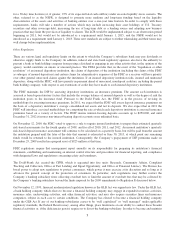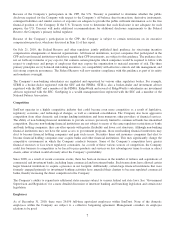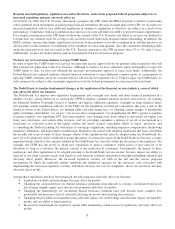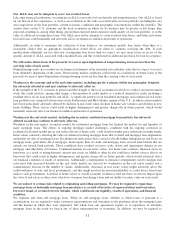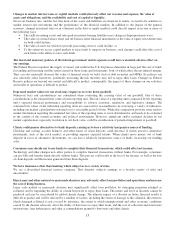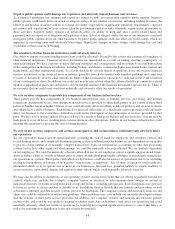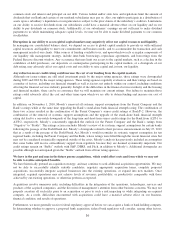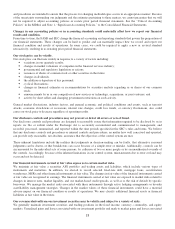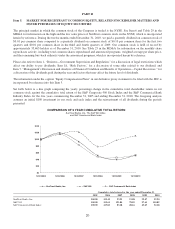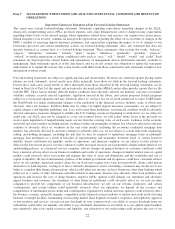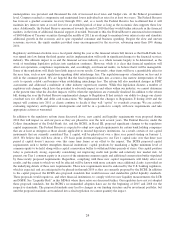SunTrust 2010 Annual Report Download - page 30
Download and view the complete annual report
Please find page 30 of the 2010 SunTrust annual report below. You can navigate through the pages in the report by either clicking on the pages listed below, or by using the keyword search tool below to find specific information within the annual report.Negative public opinion could damage our reputation and adversely impact business and revenues.
As a financial institution, our earnings and capital are subject to risks associated with negative public opinion. Negative
public opinion could result from our actual or alleged conduct in any number of activities, including lending practices, the
failure of any product or service sold by us to meet our clients’ expectations or applicable regulatory requirements, corporate
governance and acquisitions, or from actions taken by government regulators and community organizations in response to
those activities. Negative public opinion can adversely affect our ability to keep and attract and/or retain clients and
personnel and can expose us to litigation and regulatory action. Actual or alleged conduct by one of our businesses can result
in negative public opinion about our other businesses. Negative public opinion could also affect our credit ratings, which are
important to accessing unsecured wholesale borrowings. Significant changes in these ratings could change the cost and
availability of these sources of funding.
The soundness of other financial institutions could adversely affect us.
Our ability to engage in routine funding transactions could be adversely affected by the actions and commercial soundness of
other financial institutions. Financial services institutions are interrelated as a result of trading, clearing, counterparty, or
other relationships. We have exposure to many different industries and counterparties, and we routinely execute transactions
with counterparties in the financial industry, including brokers and dealers, commercial banks, investment banks, mutual and
hedge funds, and other institutional clients. As a result, defaults by, or even rumors or questions about, one or more financial
services institutions, or the financial services industry generally, have led to market-wide liquidity problems and could lead
to losses or defaults by us or by other institutions. Many of these transactions expose us to credit risk in the event of default
of our counterparty or client. In addition, our credit risk may be exacerbated when the collateral held by us cannot be realized
upon or is liquidated at prices not sufficient to recover the full amount of the financial instrument exposure due us. There is
no assurance that any such losses would not materially and adversely affect our results of operations.
We rely on other companies to provide key components of our business infrastructure.
Third parties provide key components of our business infrastructure such as banking services, processing, and internet
connections and network access. Any disruption in such services provided by these third parties or any failure of these third
parties to handle current or higher volumes of use could adversely affect our ability to deliver products and services to clients
and otherwise to conduct business. Technological or financial difficulties of a third party service provider could adversely
affect our business to the extent those difficulties result in the interruption or discontinuation of services provided by that
party. We may not be insured against all types of losses as a result of third party failures and our insurance coverage may be
inadequate to cover all losses resulting from system failures or other disruptions. Failures in our business infrastructure could
interrupt the operations or increase the costs of doing business.
We rely on our systems, employees, and certain counterparties, and certain failures could materially adversely affect
our operations.
We are exposed to many types of operational risk, including the risk of fraud by employees and outsiders, clerical and
record-keeping errors, and computer/telecommunications systems malfunctions. Our businesses are dependent on our ability
to process a large number of increasingly complex transactions. If any of our financial, accounting, or other data processing
systems fail or have other significant shortcomings, we could be materially adversely affected. We are similarly dependent
on our employees. We could be materially adversely affected if one of our employees causes a significant operational break-
down or failure, either as a result of human error or where an individual purposefully sabotages or fraudulently manipulates
our operations or systems. Third parties with which we do business could also be sources of operational risk to us, including
relating to break-downs or failures of such parties’ own systems or employees. Any of these occurrences could result in a
diminished ability of us to operate one or more of our businesses, financial loss, potential liability to clients, inability to
secure insurance, reputational damage and regulatory intervention, which could materially adversely affect us.
We may also be subject to disruptions of our operating systems arising from events that are wholly or partially beyond our
control, which may include, for example, computer viruses or electrical or telecommunications outages or natural or
man-made disasters, or events arising from local or regional politics, including terrorist acts. Such disruptions may give rise
to losses in service to clients and loss or liability to us. In addition, there is the risk that our controls and procedures as well
as business continuity and data security systems prove to be inadequate. The computer systems and network systems we and
others use could be vulnerable to unforeseen problems. These problems may arise in both our internally developed systems
and the systems of third-party service providers. In addition, our computer systems and network infrastructure present
security risks, and could be susceptible to hacking or identity theft. Any such failure could affect our operations and could
materially adversely affect our results of operations by requiring us to expend significant resources to correct the defect, as
well as by exposing us to litigation or losses not covered by insurance.
14



